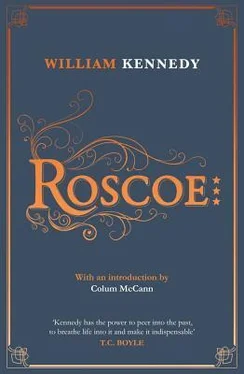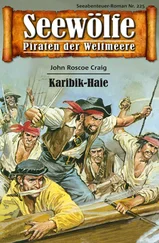When Roscoe was X-rayed after the accident, no damage was detected to the sternum or ribs, and after his collapse at Fogarty’s, the X-ray showed no change in cardiac size or shape; nor was congestive heart failure a likely diagnosis. The surgeon chose pericardiocentesis, or the needle, and as he was aspirating Roscoe’s blood into his syringe he was saying that the cause might be an aneurysm from the trauma of the accident, that it could have bled, healed, and, dramatically, bled again, and only if they opened him up, a perilous move, could they confirm that diagnosis.
Roscoe, though sedated, processed this surgical patter with some disquiet. Nothing gets Roscoe’s attention quite like the prospect of his own funeral, especially when he is conjuring the Golden Annals of the Party he is planning to dictate one of these days — Elisha’s story, Patsy’s, Veronica’s, Hattie’s, all of us, how we did what we did, what became of us, and what it meant, including our fraudulence, a golden tool, for none of these lives could have been lived without it, something Roscoe discovered in the Christian Brothers grammar school, when he too-precociously perfected a test, then wrote a brilliant essay, and was accused of cheating, though Brother William, known as Knocko, could not say how he cheated. All he could say was that Roscoe, this inattentive boyo who wanted to be in the woods with birds and game more than in the schoolroom, could not possibly have written this. Knocko, so known for his whacks with the ruler and his use of knuckles on skulls, and who never encouraged his students to be smarter than himself, arranged to prove Roscoe a fraud with a second test. Roscoe, who could have repeated his perfection, or nearly so, chose to write inept answers on the second test, sufficient to pass but not excel (Magellan sailed around the world, from Ireland), and Knocko, plus Roscoe’s parents, who were summoned to discuss the crisis, beamed at his achievement. The boy is normal — wholesomely mediocre. We won’t prosecute him for sinful superiority. It happens to many a lad. He’ll do fine.
So Roscoe as a fraud was a great success. You certainly know how to rise in the world, Ros. A year later, he confessed everything to his father, and Felix was so proud of his boy that he bought him a rifle.
This event would, of course, go into Roscoe’s Annals, which had one fiat: leave nothing out, including old Mr. Considine, the custodian at School Five, where Roscoe went before his father put him in the Christian Brothers grammar school to teach him discipline. Mr. Considine tended the boiler, swept the halls, and opened the doors for the pupils at morning. His white mustache looked like a paintbrush, and he wore a long coat and a hat that had been in style in Civil War days, a relic, as Mr. Considine was a relic, a man whose life depended on politics, and who, soon after the Republicans took the city in 1899, was gone. Mr. C, we missed your kindly patience with unruly boys, missed your vast bundle of keys, your painful walk, your missing index finger, your nose like an eagle’s beak. For Roscoe, Mr. C personified all men dependent on the prevailing political wind, and when the wind changed, here came idleness, and the shame of sitting on the stoop, hoping for the dole. This vulnerability Roscoe etched into memory, a principle upon which he, Eli, and Patsy founded the Party. If you’re vulnerable to caprice, we can help you. But if you’re not with us, you’re vulnerable to our caprice.
By late afternoon after his pericardiocentesis, with fifty milliliters of fluid withdrawn from the sac and an indwelling catheter in him for further drainage, Roscoe’s pain and general malaise diminished dramatically, and he received his first visitor: Alex, in his army uniform, a thin private first class.
“Alex, my boy,” Roscoe said, “you’re back, but, God, you’re skinny.”
“I suppose I am, Roscoe, but the same can’t be said of yourself.”
“At it already. No respect for your elders.”
“Haven’t I come to see you? Before my wife and mother? I wanted to have a chat before you died of bloat.”
“Ah, you have a charitable heart.”
“Are you all right or not? As I get it, you were watching a chicken fight and fainted at the sight of blood.”
“A perfect analysis. Too much death in my life. Parallel mortality. So they stabbed me in the heart to ease my pain.” He raised his shirt to show Alex the catheter. “This tube is in here so they can stab me again.”
“Have them put a faucet on it and drain the fat.”
“A compassionate suggestion.”
Alex was six four, usually the tallest man in the room, his hairline not what it was when he left. He had his father’s Roman nose and that loose way of moving his lanky body, plus that widely known ladykiller smile that was all his own. He wore a row of military ribbons on his shirt: the Good Conduct Medal, marksmanship medals, European-theater ribbon with three battle stars, presidential unit citation to his battalion for valor in the Battle of the Bulge, the Combat Infantryman’s Badge, and the Purple Heart.
“We never knew you were wounded,” Roscoe said.
“Very minor. They now give Purple Hearts for hangnails.”
“Tell me your war stories,” Roscoe said. “Cheer me up.”
“I did nothing. I went nowhere.”
“That’s why they gave you all those medals.”
“These aren’t medals, they’re souvenirs.”
“When were you wounded?”
“Late afternoon.”
“Where did they get you?”
“On a green hill partly covered with snow.”
“Did you get to keep the bullet?”
“I wasn’t shot. I was raked by the teeth of a flying dog.”
“Fascinating. When I get out of this bed we’ll have a party with Patsy and all your friends. Like the old days. People will want to hear your flying-dog story, and we’re long overdue for an all-nighter.”
“No, no all-nighters.”
“Don’t tell me you’ve given up drink.”
“Not at all.”
“But you’ve given up questing in saloons for the Holy Ghost.”
“I believe so.”
“The army ruined you.”
“The real question is, what ruined you, my corpulent friend?”
“Ah, me. I wasn’t aware I was ruined yet. Getting there, of course.”
“You’ve arrived, old fellow. Here you are on your back, your system breaking down from wretched excess. You’re a capital ruin, Roscoe. We should register you as a historic landmark, in need of shoring up.”
“Your tongue was viperized by the army. But I forgive your calumnies. All we want to do is re-elect you.”
“I’m for that. Let’s launch the campaign instead of a party. What are you cooking up for me?”
“You’ll have a press conference at City Hall in your uniform and praise everybody for how they carried on in your absence. You’ll tell them how we’re going to pave the streets and improve the water supply. You’ll praise Karl’s job as acting mayor in handling our coal crisis. You’ll dedicate the Honor Roll in the Ninth Ward, in memory of all the boys from the North End who served. Pop O’Rourke’s been after me for months to have you lay the wreath.”
“Pop is still alive?”
“He wouldn’t declare the Honor Roll finished until you came home.”
“What about my opposition, Jason Farley?”
“You don’t mention him. Let him get his own publicity. Now that we know you’ve been wounded we’ll drop a hint and let the press quiz you. You’ll be modest, won’t talk about it.”
“It’s not worth talking about.”
“Fine. The mystery will intensify your myth.”
“Is that it?”
“No, there’s Cutie LaRue. Remember Cutie? He doesn’t know it yet, but we plan to run him against you on an independent line, maybe the Flatulence ticket. Patsy wants a third candidate.”
Читать дальше












